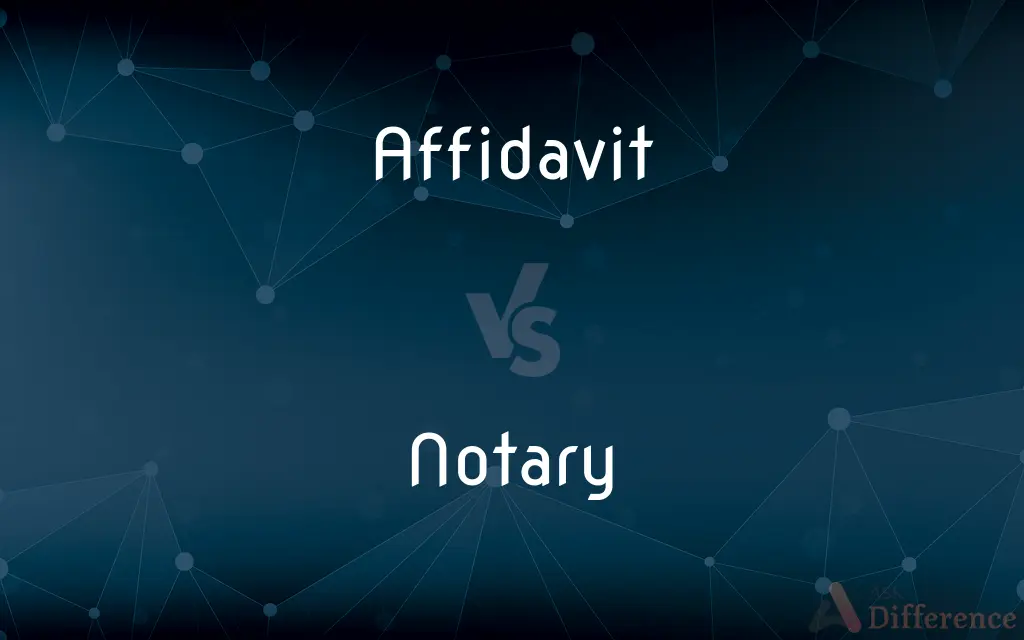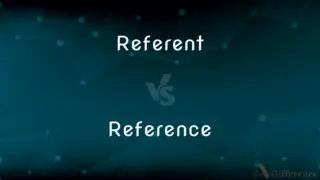Affidavit vs. Notary — What's the Difference?
By Urooj Arif & Maham Liaqat — Updated on April 15, 2024
An affidavit is a written statement confirmed by oath or affirmation for use as evidence in court, while a notary public is an official authorized to perform acts in legal affairs, such as witnessing signatures.

Difference Between Affidavit and Notary
Table of Contents
ADVERTISEMENT
Key Differences
An affidavit is a sworn written statement made under oath, used as a source of evidence in legal proceedings. Whereas a notary public is an individual appointed by the government to serve as an impartial witness in the signing of important documents to prevent fraud.
Affidavits are often used in court cases and other legal matters as a way to present factual information formally. On the other hand, notaries do not provide testimonies or factual assertions; instead, they authenticate the identities of individuals signing documents and verify that signatures are made willingly and under no duress.
The process of creating an affidavit involves the deponent (the person who gives the statement) swearing an oath or affirming their statement is true before an authorized legal person, such as a notary public. Conversely, a notary public's role can include administering oaths, but primarily focuses on witnessing signatures and applying their notarial seal as a form of authentication.
Affidavits must be specifically tailored to the legal context they are used in, containing clear statements of fact that are relevant to the case or issue at hand. In contrast, notaries are not concerned with the content of the documents they notarize; their main concern is the proper execution of those documents.
While affidavits are integral to judicial proceedings, providing first-hand evidence without the need for the deponent's presence in court, notaries facilitate a wide range of transactions, ensuring that legal documents are executed properly and are legally binding.
ADVERTISEMENT
Comparison Chart
Definition
A written statement made under oath confirmed by oath for court use.
An official authorized to authenticate signatures and administer oaths.
Primary Function
To provide evidence in court
To witness and verify document authenticity
Involvement in Legal Process
Direct, as evidence
Indirect, through document verification
Focus
Content of the statement
Authentication of the document process
Role in Legal Affairs
Specific to cases and evidence
General, supports various legal activities
Compare with Definitions
Affidavit
A document stating facts, sworn to be true.
He signed an affidavit affirming the items were his own.
Notary
An official who helps prevent fraud in document signing.
By verifying identities, the notary public helped prevent potential fraud.
Affidavit
A written declaration made under oath.
The affidavit was required to proceed with the legal case.
Notary
A person appointed to serve as an impartial witness.
The notary public ensured that the document signing was coercion-free.
Affidavit
A statement confirmed by oath for legal use.
The property dispute was settled using his signed affidavit.
Notary
An individual who can administer oaths and affirmations.
The notary public administered the oath during the affidavit signing.
Affidavit
A form of written testimony used in court.
Her affidavit was crucial in the trial's outcome.
Notary
A certifier of copies of documents to ensure they are true and correct.
She had the document certified by a notary public for legal proceedings.
Affidavit
A sworn statement made voluntarily without cross-examination.
The affidavit provided a clear account of the events as they unfolded.
Notary
An official authorized to witness signatures.
The contract was notarized to confirm each party's commitment.
Affidavit
An affidavit ( (listen) AF-i-DAY-vit; Medieval Latin for he has declared under oath) is a written statement of fact voluntarily made by an affiant or deponent under an oath or affirmation which is administered by a person who is authorized to do so by law. Such a statement is witnessed as to the authenticity of the affiant's signature by a taker of oaths, such as a notary public or commissioner of oaths.
Notary
A notary is a person authorised to perform acts in legal affairs, in particular witnessing signatures on documents. The form that the notarial profession takes varies with local legal systems.The Worshipful Company of Scriveners use an old English term for a notary, and are an association of notaries practising in central London since 1373.
Affidavit
A written declaration made under oath before a notary public or other authorized officer.
Notary
A notary public.
Affidavit
(legal) A signed document wherein an affiant makes a sworn statement.
He submitted his affidavit rather than appearing to testify in court.
Notary
A lawyer of noncontentious private civil law who drafts, takes, and records legal instruments for private parties, and provides legal advice, but does not appear in court on his or her clients' behalf.
Affidavit
A sworn statement in writing; a declaration in writing, signed and made upon oath before an authorized magistrate.
Notary
(common law) A public notary, a legal practitioner who prepares, attests to, and certifies documents, witnesses affidavits, and administers oaths.
Affidavit
Written declaration made under oath; a written statement sworn to be true before someone legally authorized to administer an oath
Notary
A notary public, a public officer who serves as an impartial witness to the signing of important documents, but who is not authorised to practise law.
Notary
One who records in shorthand what is said or done; as, the notary of an ecclesiastical body.
Notary
A public officer who attests or certifies deeds and other writings, or copies of them, usually under his official seal, to make them authentic, especially in foreign countries. His duties chiefly relate to instruments used in commercial transactions, such as protests of negotiable paper, ship's papers in cases of loss, damage, etc. He is generally called a notary public.
Notary
Someone legally empowered to witness signatures and certify a document's validity and to take depositions
Common Curiosities
What is an affidavit used for?
An affidavit is used as evidence in legal proceedings, providing sworn statements of fact.
What types of documents do notaries typically work with?
Notaries work with various documents, including contracts, deeds, and affidavits.
What happens if you lie on an affidavit?
Lying on an affidavit is perjury and is punishable by law.
Is an affidavit valid without a notary?
No, affidavits typically need to be notarized to verify the identity of the signer and the authenticity of the oath.
How do notaries verify identity?
Notaries verify identity using official documents like passports or driver's licenses.
Are affidavits used outside of courtrooms?
Yes, affidavits can be used in any situation requiring a legal declaration of fact.
Can notaries provide legal advice?
No, notaries are not allowed to give legal advice unless they are also licensed attorneys.
Can anyone write an affidavit?
Yes, anyone can write an affidavit, but it must be sworn before an authorized person like a notary public.
How long is an affidavit valid?
An affidavit is valid as long as the issue it pertains to remains relevant and unresolved.
Who can become a notary public?
Individuals who meet specific legal qualifications and are appointed by the government can become notary publics.
Can a notary public refuse to notarize a document?
Yes, a notary can refuse if the document or ID is suspect, or the signer is not present or coherent.
Is a notary public's seal always required?
Yes, a notary must use their seal to notarize documents legally.
Who can witness an affidavit?
A notary public or any other person legally authorized to administer oaths can witness an affidavit.
How often do notary publics renew their commission?
The renewal process varies by jurisdiction, but it typically occurs every few years to maintain their status.
What is the difference between a notary and a lawyer?
Notaries authenticate documents, whereas lawyers can represent clients in legal matters and provide legal advice.
Share Your Discovery

Previous Comparison
Internet vs. Intranet
Next Comparison
Referent vs. ReferenceAuthor Spotlight
Written by
Urooj ArifUrooj is a skilled content writer at Ask Difference, known for her exceptional ability to simplify complex topics into engaging and informative content. With a passion for research and a flair for clear, concise writing, she consistently delivers articles that resonate with our diverse audience.
Co-written by
Maham Liaqat













































